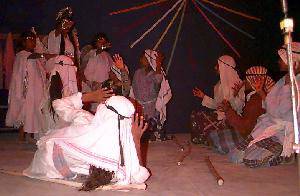

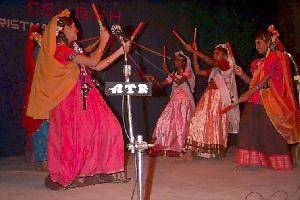
Fort School (Elementary), Primary School (LKG & UKG), and separate girls and boys Upper Secondary, as a set are one of numerous school complexes in the city. The boarding home attached to this place use to be one of many projects run by Christian Children's Fund. After a twenty year project lifetime they turn their operations over to some other institution, in this instance Compassion International. This gets really complicated... The Church of South India owns the property. They operate a school, sort of a public school in that it is open to all kids but at the same time even the poorest have to pay something. For some of the kids who have no home there is a boarding home. There are 140 boys and 140 girls living in their respective hostels. There is also a section for handicapped children. Over a five thousand students attend this school. In Tamil Nadu 65% of the children are in school.
Children who live at the CSI home have to be sponsored by some means
to pay for living expenses and tuition. Compassion International funnels
money from contributors around the world to Church of South India on behalf
of the individual sponsor-child relationships. Some children are directly
sponsored by individuals. This is where my friend Mr. Cook gets involved.
By bypassing Compassion International and working directly with the boarding
home he is essentially able to sponsor two children for the price of one. 
My part in this is a matter of a long term friendship and of being in the right place at the right time to be a major contributor (one time?). From there it went to --Why not come along with me and see what the place is like?
Well, I'd never been to India, could be a new place to fly a kite. What the heck, by the time I get to London its about as far back via LAX to New Zealand as it is to continue onward to New Zealand via Erode! So here we are at the Girls Boarding Home Christmas Programme.
The train let us off Tuesday morning. New words for the night before
are Annan (ah-nun) and Tambi, meaning elder brother and younger brother.
Tuesday evening was what might be called a Christmas pageant back in the
states; here it was only partly of Christmas. There were three or four
speeches, several other dances and skits, and then the Christian Christmas
story rendered in Tamil with some very well done singing and dancing. 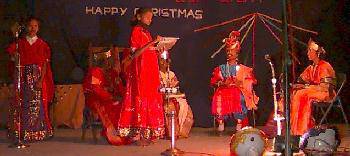
One of the performances, the Stick Dance, a rhythmic ballet that uses two sticks in the hands of each dancer, is a Gujarati dance, from Gujarat, that describes a folk story about life in the village. The colourful silken costumes the girls wore flowed and rippled like water over pebbles in a brook as other voices and music told the tale. It was hard for me to follow the story, even with the help of an interpreter trying to shout in my ear, but the sense of rhythm and the flow of the ballet told its own tale.
Electric Power--Off and On... Power goes out several times a day for a few minutes to several tens of minutes. Sometimes it looks like only one phase is out. The building behind the hotel has an autostart genset that waits a couple of minutes to be sure the outage is not some minor hiccup and then it starts. The noise it makes is more of an annoyance than the loss of power in the first place. Noise seems to be de regueur: horns blare constantly in the street--ding-ding from the bicycles, mmbeep-mmbeep from the scooters, waaa-waaa, hooonk-hooonk, blaaat, woooo-wooooo from the train floats over all, waaank-waaank from the big bus; and then the music from the sound system at the school functions is a shrill screech that penetrates even the best approved OSHA ear plugs.
This is the end of the school term, Christmas break starts Saturday,
so the kids are doing their examinations. This morning while some of them
were sitting exams I addressed boys from the secondary school on the subject
of kites and string figures. They know what kites are but there is seldom
wind enough at this time of year so all we could do was talk about them,
run to and fro across the stage to see how they fly and then hang them
on the wall. February has the wind in storage. 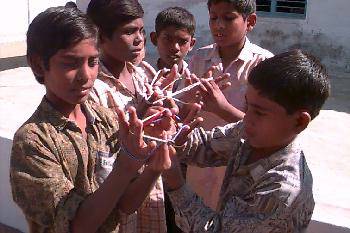
The cat's cradle game was something they could get their fingers into and I could have used another umpteen yards of cord to satisfy all the eager hands. In the end there was more a shortage of time than string when the headmaster said it was time for this group to return to their studies and prepare for their exams. D.Jayaprakash, J.Daniel, M.Edwin Prabhu, V.Nithiya Saalan, and Sudhakaran are five of the boys who helped me with the string figures; they were very quick to pick up on the movements.
In the evening I went along with Project Director Mr. Henry and Boys'
Headmaster Mr. Moses as Guest Inspector to have a look at room decorations
and programmes of the several living rooms of the Boys' Boarding House.
There are three rooms in each of the upper and lower sections housing from
four to forty boys. Each boarder has a sleeping mat, and a shelf on which
to keep belongings, usually in a small trunk. The rooms had a festive atmosphere
with paintings the boys had done on the walls, paper decorations, lights
and Christmas trees. Each group had prepared a song or dance, some had
speeches to read or recite or special presentations. After all that the
entire population of the boys' home gathered in one hall where I told some
stories about Antarctica and attempted to answer questions put to me through
the interpretive efforts of Mr. Moses. At the end I presented a copy of
the Christchurch Wizard's New World Map to the head-boy of senior boys'
hostel B who impressed me the most with their presentation. 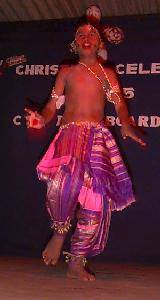
All these people have a disconcerting affectation of slightly wagging their heads side to side at times whilst you are talking to them; they're not saying no-no, there is a wee bit of a yes-yes bounce to the wagging, especially when you get use to the look in their eyes. But often they don't really understand and there are lots of opportunities for boundless confusion.
Petrol costs 20 Rs per litre and a short loaf (as opposed to a long loaf) of familiar white thin-sliced sandwich bread costs 5 Rs; it might give you an idea what the cost of living here is like when you compare those prices with what the same items cost you.
Ask me sometime to show you the mouse Mr.Edward gave me. If there is
anything left of it after I show it to El Gato I am sure she will be happy
to share. 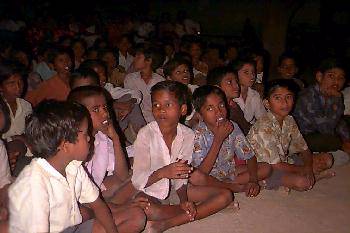
In one shop we went to purchase Elephant Glue (super glue) and Goat
Breath (mouthwash). At the toiletries counter a young man waited and helped
with the selections while Issac translated; when the item was decided he
filled out a sales slip in duplicate (using c-a-r-b-o-n paper) handing
one copy to Issac and the other and the merchandise to a small boy wearing
a laminated photo-I.D. who would carry the mouthwash to a cashier. The
entire skit was carried out again at the glue counter, different salesman,
different small boy. When Issac and I arrived at the cashier and handed
over the two sales slips they were matched up with slips on the shelf and
we paid the cashier for the merchandise and it was bagged by another boy.
Altogether, six people were employed in this purchase of two items. In
America, not to mention several other countries where child labour has
been exchanged by society for child welfare, these same purchases would
be self-service and handled by an indifferent clerk at a super-duper- money-saver.
The Elephant (brand, imported from Japan) superglue cost 36 Rs; actually
pretty expensive considering that iddly and sambah with coffee for breakfast
costs 8 Rs. Personally, all things considered, I'd vote for child labour
over idle children anytime. 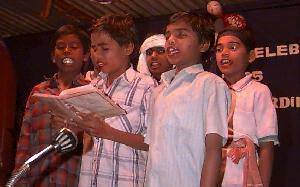
I was also looking for some string and a travel agent. And a post office. And a FAX. The FAX is pretty easy but email is unheard of; some people know what a computer is but few have seen one up close. At the government telecommunications office sending a FAX a few towns away cost 15 Rs. Next door at the post office Issac helped me wade through the process of mailing a postcard. The first window to get the card weighed and determine postage, the second window to purchase stamps; 8.75 Rs to post a card but it was not clear to me if that was by surface or air. But then one takes card and stamps outside to the paste table to get them affixed. Apparently stamps are not pre-glued; they sort of looked like there was glue on them, maybe it is considered unsanitary to lick them, but on a table outside is a pile of grey, gooey, stuff that one spreads with ones fingers on the stamp to affix them on the letter or card.
Another hour or so went to exploring the bus system. There is a fairly
extensive government run intercity network of buses leaving hourly and
there is a private system of so called "super-bus" that ply some of the
same routes less often, some only once a day, but with better equipment.
The super-bus generally requires reservations and costs more, the government
bus costs less, takes the same time but will be more crowded. It is my
plan to take an overnight trip to Maduri, five hours south, Tuesday and
Wednesday; more on that later. 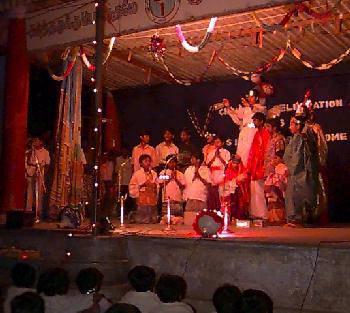
More shopping and walking and beeping and honking around on auto- rickshaws
later and Issac delivered me back at the CSI school complex for the Fort
Elementary School Christmas function. Like the secondary schools of the
previous days except that this one has boys and girls together and there
is more parental involvement and more kids. Quite a crowd; fortunately
the speeches were not as long for the programme made up for it. Then in
the evening I had dinner with the family of the headmaster. This community
of Erode, at the level of the CSI schools, has little real contact with
the outside world. Despite all the letters that go between the sponsored
children and their patrons, Manjula translates 200 required quarterly letters
and on average fifty optional letters per month, there are few visitors
of the sort who might come to a school in America for instance and do a
Show&Tell so when some one does show up they are instantly mobbed by
the children and deluged with invitations to functions and meals. The children
are mostly content to just touch, to shake hands, they walk past and wave
a salute, --Good morning sir! Sometimes they will sit and stare, they can
maintain eye contact like a cat. The adults want to have you to lunch or
dinner, to meet their sons and wives, in that order, to know what you do,
to look at postcards and pictures from everywhere else. 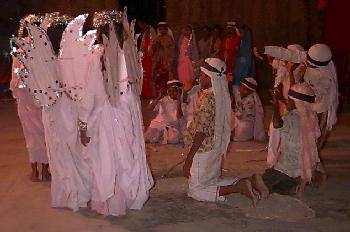
So that was all for yesterday; now let's see if I can stay awake long enough to write about today, which is still Saturday.
Mostly more of the same. Three more school functions; its that time of year, functions, examinations and then a holiday until the first week of the new year when the final quarter of the academic year begins; and a luncheon that I took a rain-check for so I could catch up on some of this letter, I will redeem it next rainy season maybe.
Mr. Cook interviewed a new applicant for sponsored admission to the
Boys' Boarding Home and CSI school. Navinkumar is in 7th standard (grade)
at his present school in Ooty which is 7 km from his home in Kalhatty,
Nilgiris District. He heard about the CSI school from an announcement made
in his parish. This boy, who is third in his class of forty students, has
both parents and lives at home but finds it difficult to get to school
regularly during the rainy season and for this reason has made application.
In order to be accepted at the school Navinkumar would be required to move
to the boarding home and that will cost more than half the monthly income
of his family and there are two other children to support at home. There
will be twenty openings at the boarding home for the coming year when the
present twelfth standard moves on and more than two hundred applicants,
many from homes less well off, from children who do not have both parents. 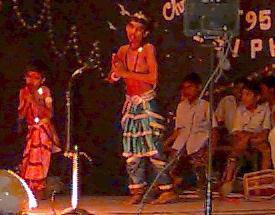
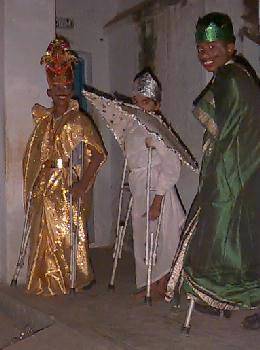
Backstage at the pageant there was aluminium to frame up a 747 as parents and teachers dressed angels and wise men while on stage an orchestra consisting of keyboard and percussion instruments as well as six or eight boys' voices rendered support for dancers in braces. In our capacity as prominent visitors Mr. Cook and I were pressed into service for keynote address and distributor of gifts when the chief guest on the programme did not show up. My part was to take the new brightly painted metal trunks from an administrator as he called the student's name and then as each student hobbled or was carried to the stage I would present the trunk, shake hands, hold still for a picture, and think about how brave these children are and wonder what goes on in their minds.
Inside their compound after the programme the traditional meal of chicken
briani with rice and red onion with curd was served by the staff to all
guests and children. As they went through several sittings I had time to
wander and wonder. Though these kids were always smiling and as eager as
they were to shake my hand and pose I found it difficult to take pictures;
perhaps it was my sadness reflected in their eyes that I saw. It was hard
for me to view them through the lens. I felt helpless and wanted to leave
but at the same time fascinated with a sense of morbid curiosity to learn
how they cope, not just the kids, but the staff as well; this is my first
time in a place where the "Parents' Night" dinner is served on banana leaves
and eaten with one's fingers (right hand only please), where children have
no Teddy bears. (For regular meals at the boarding homes the children eat
from steel plates, a plate and a spoon being part of their personal possessions,
tho fingers are still the preferred utensil.) 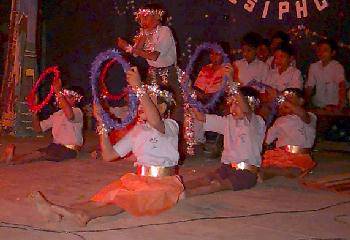
But that may present a distorted view of the matter.
Actually I have not had so much fun playing with my food in a long while. Separate piles of brown and white rice on a banana leaf are an excellent medium for the creation of graphic designs in the leftovers although I don't see anyone else indulging in this pastime. And there are no dishes to wash; you fold your banana leaf in half to indicate that you are finished eating, otherwise the servers will continue to heap on seconds and thirds, and later toss the whole leaf and scraps in a pile where it becomes forage for another layer in the food chain. Cows, goats, beggars. There is little remaining for the Untouchables to cart away.
The children have no need of bears, they have each other; and what they do have seems to be freely shared but even this opinion may be the result of a distorted view; I have not been here long enough to understand it all.
One must spend sufficient time living in another culture to understand it; ask to be tolerated as a guest, long enough to learn the language, appreciate the customs. Understanding may come but it will be wordless. When you understand what is foreign then it is no longer foreign and you loose the urge to explain it.
Tiruppur is on the railway about halfway between Erode and Coimbatore
just over the line in Coimbatore district. We went by car. Car and driver
for the day. Having someone else do the driving is the only sensible way
of travel by car on these roads; I may have mentioned that once but it
bears repeating, if you are coming to India keep it in mind. Tiruppur is
about 50 km west on India Highway 47, sixty if count the extra distance
going through or around potholes, avoiding 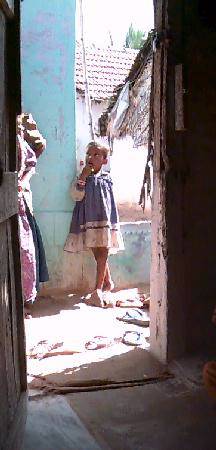 ox carts and the zig-zag of the police checkpoint at the district border
between Coimbatore and Periyar near Perumanallur. Tiruppur is the home
of one of the sponsored children and this sort of house call is part of
the qualification process, a periodic visit just to see how they are getting
on at home and to maintain ties with the family.
ox carts and the zig-zag of the police checkpoint at the district border
between Coimbatore and Periyar near Perumanallur. Tiruppur is the home
of one of the sponsored children and this sort of house call is part of
the qualification process, a periodic visit just to see how they are getting
on at home and to maintain ties with the family.
The house we visited has seven families living in an area I judge to be thirty feet across the front by about sixty feet deep. Each family had one room maybe eight by twelve feet, except the property owner had two rooms, and they shared the courtyard and toilets and well. I estimate 12-15 people were there, from carried children up to grandmotherly types, mostly women. This was a middle class home; the construction was cement with tiled roofs, electricity was available and the owner's apartment had a television.
As you come in through the front gate the well is immediately on the
left, the communal toilet is just beyond and there is a bit of a common
area there also. Drainage from the toilet runs out through the front wall
to the trench of the open sewer along the street. Straight ahead is the
open courtyard and the six one room apartments are along both sides with
the owner's apartment across the back. All the tile roofs pitch in over
the courtyard. The apartment we visited held one bed shared by mother and
daughter, no father in this family, table, chairs, a cupboard for cooking
utensils and a small stove. Everything was very clean, which seems to be
the case in every home I have seen; even the thatched roofed mud huts look
pretty clean on the inside compared to the squalor surrounding them. 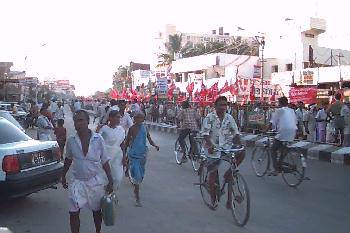
Lunch was laid on in the owner's apartment with several of the other women helping the mother and daughter we had come to see. Our party consisted of Mr. Cook and me and three people from the CSI school. Lunch was the usual rice and sauce but with the addition of small boiled potatoes, sliced apples and tangerine sections. Yum. Finger licking good. No chicken briani.
On the return trip, at the first intersection marking more or less the
edge of downtown Erode, the traffic came to a halt. Fortunately our driver
was able to extricate us from the pile and for half an hour we snaked through
back streets and alleys along the south side of Brough Road and eventually
came out at our hotel to find a Communist Party rally parading in the east
bound lanes. There are four major political parties in Tamil Nadu, the
Communists are a near fifth in strength. At present India is the largest
democracy in the world and by the early 21st century could surpass China
in total population. 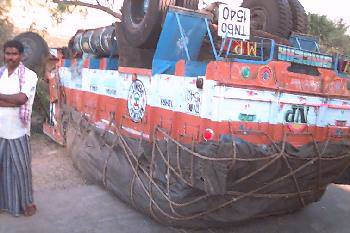
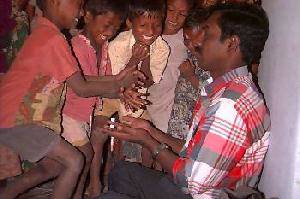
White lines in the road, where there are any to be seen at all, mean
just the opposite of anywhere else--once you cross the broken centre line
on a straight-away there is no crossing back on the curve. Drivers honk
and wave in a code similar to what I have observed in use by American truckers--this
wave means Pass me if you dare, that one means I would if I were you. The
rule that pedestrians have the right of way is unheard of; the biggest
vehicles and loudest horns generally command the traffic lanes and if you
don't move over you will be hit. Few traffic lights exist, fewer
still work; there are no speed limits, none posted anyhow and in a conversation
with one of our drivers he said there were none, and there are no stop
signs anywhere in Erode that I have been. From an American or New Zealand
perspective it is amazing that the carnage on the highways and in the cities
is not greater. Many times in the past few days and especially in Madurai
I have been pulled aside by my companion from the path of some vehicle
and it matters not whether one walks facing the traffic, the rickshaws,
bicycles, and, occasionally, even a motorcar will come along behind you
on the wrong side of the way. 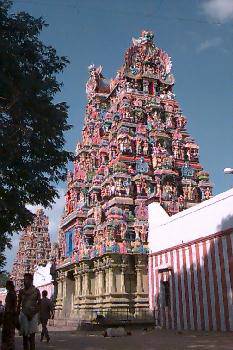
On the road to Madurai, about 200 km, our bus made three pit stops; two were at terminals at Karur and Dindigul and one was at a way station. Vendors hawking tangerines and fried dough would surround the bus before the driver had berthed it at the terminals and white skin seems to attract beggars like flies to feces. I have always been pretty good about finding toilets in strange places but here the Indians have disguised them so well--sometimes as piles of split coconut shells, or graffiti'd walls. Upon disembarking one has only to follow the crowd and be surprised. In some places there are walled enclosures where the women go; the men line up along the verge or wall or gutter.
After getting settled in the Annapoorna Hotel and delivering a package of rare Bic pens carried all the way from London to the Aravind Eye Hospital, Krishnan led the way to Madurai's major tourist and cultural landmark.
The Sri Meenakshi Temple was originally built by Kulasekara Pandya.
"However, the entire credit for making the temple as splendid as it is
today goes to the Nayaks who ruled Madurai from the 16th to 18th century.
It is a twin temple, one of which is dedicated to Meenakshi (Parvathi)
and the other to Lord Sundareswarar (Shiva). Twelve gopurams (towers)
grace the temple which is rectangular in shape. 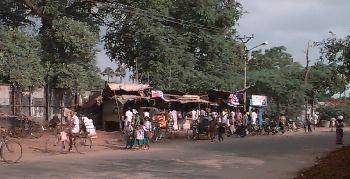 Of these the southern gopuram is the tallest (49m) and the only
one that may be climbed. [Ed note: The south tower was closed when we visited;
no explanation given.] This temple is one of the best examples of Dravidian
architecture and sculpture. The hall of a thousand pillars is a museum
of icons, photographs and illustrations. Apart from being a very sacred
spot for the Hindus, the Meenakshi temple is one of the country's most
important tourist landmarks." [Road Guide to Tamil Nadu]
Of these the southern gopuram is the tallest (49m) and the only
one that may be climbed. [Ed note: The south tower was closed when we visited;
no explanation given.] This temple is one of the best examples of Dravidian
architecture and sculpture. The hall of a thousand pillars is a museum
of icons, photographs and illustrations. Apart from being a very sacred
spot for the Hindus, the Meenakshi temple is one of the country's most
important tourist landmarks." [Road Guide to Tamil Nadu]
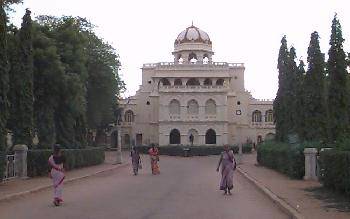 One
could wander around in the temple for a few days and not see it all even
with parts of it being closed to the public. The hall of a thousand pillars
has almost as many panels and displays to read and hundreds of different
stone carvings and sculptures. Admission was only a few Rupees and an extra
fee is charged for photography. Beggars and street urchins compete for
your money and vendors jump from their stalls when a white face appears
in the crowd. --Postcards postcards! they cry, Ten postcards, all different.
They know there is no email, they know I am suffering withdrawal... Postcards
are not the only item--holy towels, brass bells, brass lamps, jewellery
sufficient to rival the Tower of London. But there are also plastic toys
of all sorts, enough to open a Toys-R-Us. I was especially annoyed to see
the toy weapons of childhood offered for sale along side the holy towels
in the temple of this land of Gandhi.
One
could wander around in the temple for a few days and not see it all even
with parts of it being closed to the public. The hall of a thousand pillars
has almost as many panels and displays to read and hundreds of different
stone carvings and sculptures. Admission was only a few Rupees and an extra
fee is charged for photography. Beggars and street urchins compete for
your money and vendors jump from their stalls when a white face appears
in the crowd. --Postcards postcards! they cry, Ten postcards, all different.
They know there is no email, they know I am suffering withdrawal... Postcards
are not the only item--holy towels, brass bells, brass lamps, jewellery
sufficient to rival the Tower of London. But there are also plastic toys
of all sorts, enough to open a Toys-R-Us. I was especially annoyed to see
the toy weapons of childhood offered for sale along side the holy towels
in the temple of this land of Gandhi. 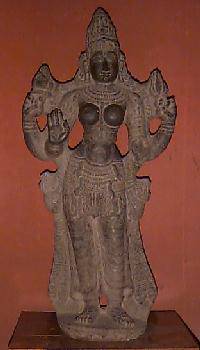
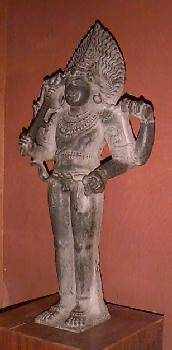
The contrasts of this place are what is most important I think. Cell phone antennae share the skyline with ancient temples; India's second communications satellite has just reached stable orbit above a countryside where the scourge of polio has yet to be eradicated. The range between poor and rich is really not all that greater than what I have observed in America but the contrast is sharper, the gradient steeper.
The Gandhi Museum, dedicated to Gandhiji's life and work, is housed in the 300-year old Mangammal Palace. It has a collection of his books and letters, a fine exhibition of South Indian village industries and in a adjacent building is a State of India cultural and natural history museum.
"He stopped at the thresholds of the huts of the ... dispossessed, dressed
like one of their own. He spoke to them in their own language ... Who else
has felt like him that all Indians are his own flesh and blood?" --Rabindranath
Tagore, National Poet. Thus opens this museum celebrating the life of the
man who led India to self government after 200 years of British rule. The
history I read of Gandhi's leading the Salt March gave me to understand
why salt is served with such ceremony at some meals. 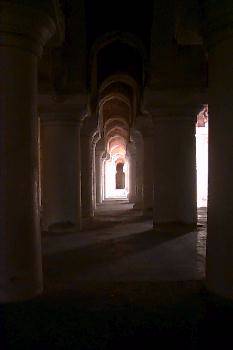
The Palace of Tirumalai Naik--1623-1659 is next on the list. Also known as Tirumalai Nayakkar Mahal (mahal means palace), and located near the Meenakshi Temple, the remains again illustrate the architectural mastery of the Nayaks. There must be more than a thousand columns in this structure; great soaring domes, carved moldings, icons, statues, all attest to an effort I can scarce imagine being accomplished today never mind in the mid sixteen hundreds. The paint is peeling, at the base of many columns stucco is cracked and fallen away exposing the brick and rubble interior, parts of the palace are closed for lack of maintenance, yet the mahal still speaks loudly of the grandure of a harsh king.
Beggars--to give or not to give, that is the question. I asked Krishnan
how he determined which beggars he would grace with his coins and which
he would refuse. There had been several occasions when he would give one
rupee to a beggar or tap me for a coin if he had none and just as many
times he would refuse them and even threaten to call a policeman if they
were persistent. Why some and not others? Even when I would give a coin
on my own Krishnan would sometimes sign that I should not. 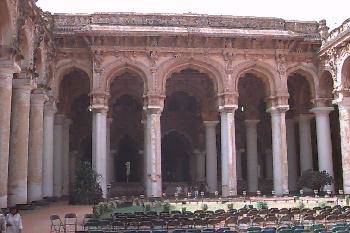
Eventually I managed to learn from him that he looked at each person
and tried to form an opinion about them--old men, especially disabled or
of a religious bent he always gave to, generally we found this sort at
the entrance of temples and occasionally on the street; young mothers,
always with babe in arms, he would study and sometimes give sometimes not
(maybe he was asking them questions) depending if he felt they were supporting
elderly parents as well as their children; young children, mostly boys,
rarely girls, too young to work, he would always chase away, if you give
something to one there will be a herd of them come out of the walls; older
children, who should be working, he would always refuse. 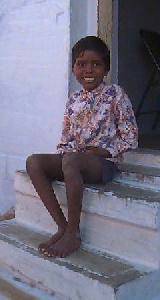
The interview was conducted in the single room home the boy shares with
his aunt and uncle; he was brought from school by his sister who is also
living there presently since boarding school is closed for the holiday.
Gopu's mother was also present. I asked most of the questions with Manjula
translating and filling in what she already knew from the record. Nine
years and third standard don't quite match up; the age-grade relationship
should have him more at seven years. I noted in the first few moments of
getting acquainted that he did not 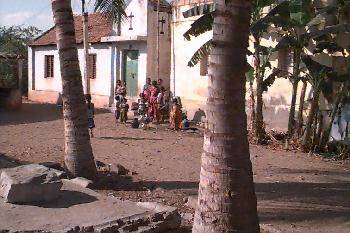 have his second teeth, had not yet lost his first, and pointed that out
to Manjula. Gopu's mother had put nine years on the boy's application because
she felt it would increase his chances of acceptance at the boarding home.
In order to start the third quarter, two days after New Years, at boarding
school a direct sponsor must be found before the end of December. For less
than the cost of a business class flight from LAX to CHC this boy could
be sponsored at the boarding school for ten years.
have his second teeth, had not yet lost his first, and pointed that out
to Manjula. Gopu's mother had put nine years on the boy's application because
she felt it would increase his chances of acceptance at the boarding home.
In order to start the third quarter, two days after New Years, at boarding
school a direct sponsor must be found before the end of December. For less
than the cost of a business class flight from LAX to CHC this boy could
be sponsored at the boarding school for ten years. 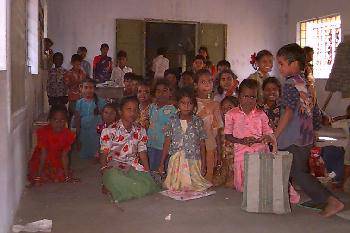
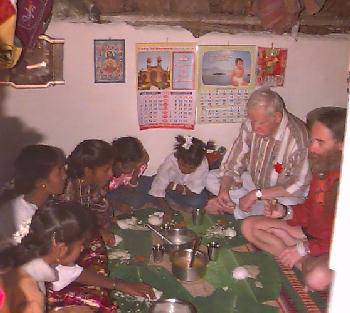
Sivakami, one of the sponsored children who lives at the Girls Boarding Home during the school year, is visiting her mother and father and two sisters for the Christian holiday. Today we had breakfast at the home of Sivakami. Mr. Cook, several other boarding girls, Issac, me, Sivakami--her mother and sisters served the meal, walking between the two small rooms in which they lived. Electric wires pass above the thatched roof but there is no drop here; cooking is usually on a small wood or eruvamutty (sun dried cow dung patty) fire tho a single burner pressure gas stove is available. Some of the ways between homes are hard packed earth, swept clean, some are cement--everything is clean and we all leave our sandals at the door and sit on their sleeping mats for the meal. Iddly and sambah have been supplemented on this special occasion with vadai (a spicy baked grain puff) and payasam (thin tapioca like flavour with "noodles") and then Sivakami leads me on a tour round her village and back.
Child labour vs juvenile delinquency has come round again as a subject
of discussion. It is unquestionably a simplistic viewpoint on my part to
maintain that child labour is better for the child and 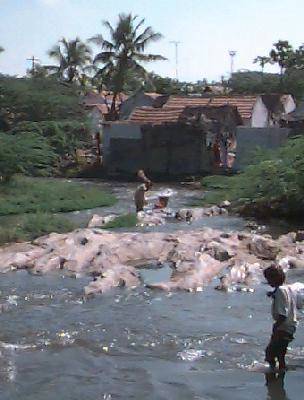 more productive for the community than the juvenile delinquency I see as
the trade off but the fact remains: There are no idle youths standing around
the street corners in Erode; I feel very much safer on these crowded streets
than I do on those of Miami or Los Angeles. And yet India is trying to
outlaw child labour without considering the consequences nor the alternatives.
We have had some interesting discussions, it is a complex issue.
more productive for the community than the juvenile delinquency I see as
the trade off but the fact remains: There are no idle youths standing around
the street corners in Erode; I feel very much safer on these crowded streets
than I do on those of Miami or Los Angeles. And yet India is trying to
outlaw child labour without considering the consequences nor the alternatives.
We have had some interesting discussions, it is a complex issue.
Its kind of neat the way my T-shirts come back from the laundry ironed, and folded just so with a piece of crinkly paper inside.
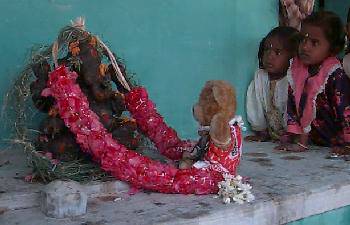
Vannankattuvalasu is west of Erode by a half an hour and then a little
south of the main road. The village well has a tap rather than the manual
pump I have seen in all the other places I have been in the past few days.
Sampoornam lives with her mother, father, and two sisters right across
the street. After the usual sitting around long enough for all the neighbors
to have good look and after breakfast and photos all round we commenced
a parade to the temple where Ganesh holds court. Ganesh works for Brahma
as Lord of Good Things; there is a shrine for Ganesh right out in front
of the Sivranjani Hotel here and every time we have returned with garlands
from another meeting I have left them off with Ganesh, as much a plea for
protection on the next trip as atonement for all the bad things I have
been thinking about the driver of that one. So far its working. 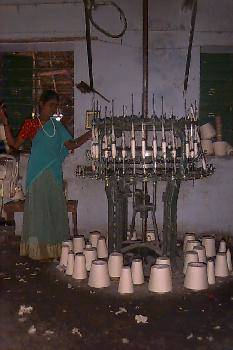
Between brunch and lunch, the former being mid morning and the latter being mid afternoon, we visited a textile mill. A little like Lowell Massachusetts in the late 1800's complete with the children loading bobbins into the shuttle. Fourteen looms and a bobbin winder were running, powered from a system of overhead belts and pulleys, in each of two buildings. There were not all that many workers around, half a dozen or so, the youngest was said to be fifteen but there was one ten-year old girl who had just been taken on as apprentice floor sweeper and bobbin winder. The mill was producing bolts of cotton cloth which would later have designs printed on and then be made into lungis (a kind of one piece wrap used my men to sleep in).
Tomorrow we begin to move again. The visits are over; the school's on
holiday, time to get on the road. We will visit a Gipsy colony near Erode,
a tea plantation near where Issac's family lives in Nilgris, a wildlife
sanctuary in Mudumalai, all over the next four days on the way to the airport
in Mardas. 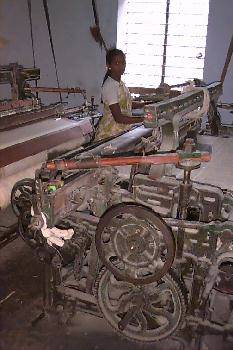
A last word from the Gandhi Museum--
"Where the mind is without fear and the head is held high;
Where knowledge is free;
Where the world has not been broken up into fragments by narrow
domestic walls;
Where words come out from the depth of truth;
Where tireless striving stretches its arms towards perfection;
Where the clear stream of reason has not lost its way into the dreary
desert sand of dead habit;
Where the mind is lead forward by thee into ever-widening thought and
action--
Into that heaven of freedom, my father, let my country awake."
--Rabindranath Tagore
I would offer that thought, paraphrased slightly perhaps, as a prayer for the future of the Internet.
Vanakkam, Poondu
A.J.Oxton, OA, OO, OAE, k1oIq

Back to ajo
Copyright © 2003, A.J.Oxton, The Cat Drag'd Inn , 03813-0144.![]()